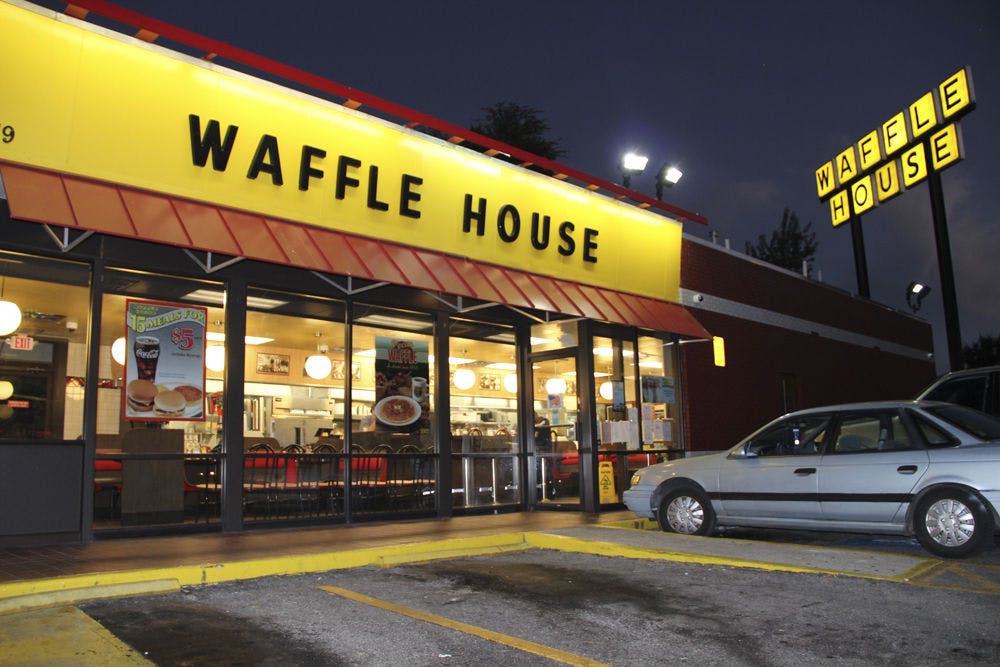The iconic 24-hour diner Waffle House has won over hearts for decades with its simple, yet dependable menu. But one service it provides to the community proves relevant during the hurricane season.
The cultural significance of Waffle House runs deeper than a classic breakfast spread. Many know and love the franchise for its reliability displayed during extreme weather events. Local communities have begun to follow Waffle House’s protocols as a means to measure how detrimental a storm is, otherwise known as the “Waffle House Index.”
The term “Waffle House Index'' was coined by FEMA Administrator Craig Fugate in 2011. Fugate, who had previously worked as Emergency Management Director in Florida, recognized Waffle House’s reputation for rapid disaster preparedness.
The index has three levels based on the resources available including manpower, power and food. Green indicates a full menu, minimal or no damage and working power. Yellow implies a limited menu as a result of inconsistent power or food supplies running low. And red means the restaurant is closed as a consequence of severe damage, flooding or destruction of the restaurant.
Njeri Boss, 51-year-old president of food safety and public relations for Waffle House, works as a member of the crisis response team who works with those in the field during natural disasters to make decisions about the best way to approach it.
“If we're closed after the storm, then that means there's some pretty significant damage that we weren't able to overcome right away and that meant that the community itself probably also would evidence that same kind of damage,” Boss said.
Waffle House is one of the several businesses that state, local and federal governments have partnerships with to measure how quickly a community can get back on their feet. It is able to discern certain communities and areas in need of assistance using the large quantity of Waffle Houses dispersed across the nation.
It also used the Waffle Houses to evaluate which communities needed immediate assistance versus those whose needs were not as urgent.
“Of course, everybody needed aid, but they were trying to prioritize those areas that were very strongly hit and had significant damage,” Boss said.
The planning process and decision making of operating restaurants in the wake of a storm is far more complex than the universal label of a color. Waffle House has a comprehensive process before coming to a conclusion.
First, they determine whether it is safe to operate by evaluating the information they receive from the state, local municipalities, federal agencies and weather information. They start making decisions about ten days in advance because the technology to track them is available.
“We work with law enforcement and the state. We're not going to do anything to place our people in harm's way,” Boss said. “If there's a mandatory evacuation then that means we're going to be shutting the restaurant down. If there aren't mandatory evacuations, we're also looking at potential flooding, road closures, those kinds of things.”
Second, they speak to associates about childcare and options for protecting their families.
“No one wants to work when they're feeling as if their family may not be safe. So we want to make sure that that's taken care of for them,” Boss said.
Lastly, they plan for potential scenarios.
“Every year we update our store and playbook, which includes different menus for different situations. We don't have water, we still can operate and if we don't have electricity, we can still operate,” Boss said.
On Aug. 29, just hours before Hurricane Idalia was predicted to strike Florida’s Gulf Coast, several Gainesville residents enjoyed plates of hot breakfast cuisine after preparing for the impending storm.
Among them were three UF juniors, 20-year-old Amanda Branon, 20-year-old Dillon Vann and 19-year-old John Glass, who had lived through several storms in Gainesville, but never witnessed a closed Waffle House during that time. After stocking up on water, boarding up windows and charging electronics, the three knew the perfect spot to grab a bite.
“[Waffle House] is always going to be open unless the storm is actually bad,” Branon said. “That is why I chose this place, I am like ‘They’re gonna be open today.”’
While sharing a similar craving to the three for a fresh-hot meal, 50-year-old Danny Butler had a different approach to preparing for the storm. Born and raised in Gainesville, Butler predates the Waffle House he frequents.
In anticipation of Hurricane Idalia, locals shared a sentiment of fear, anxiety and uncertainty.
“I've been through a lot of storms. But I don't know what this is gonna be like,” Butler said. “It can turn bad, it can turn ugly.”
Trusting a local Waffle House and its thorough research has relieved stress for many. Its commitment to the community and associates has proven reliable in creating a safe and reasonable decision in wake of a storm.
“We're very proud of the service that we provide,” Boss said. “We have been doing this for more than 35 years in terms of trying to be there for our community and our associates because we have a commitment with our associates.”
Waffle House values creating a seemingly normal environment during communal struggle. It establishes itself as a reliable constant through times of uncertainty.
“We have a commitment to the community, because there is nothing better than seeing something that appears normal. What was normal for you after you have gone through something so horrific,” Boss said. “It gives them a sense that whatever this new normal is going to be it's right around the corner, they can just hold on a little longer.”
Contact Molly Seghi at mseghi@alligator.org. Follow her on Twitter @molly_seghi.
Molly Seghi is a first-year journalism major at UF and a Fall 2023 Avenue Reporter. When not writing or journaling, she can be found at a live music event or working on her podcast “An Aural Account.”





